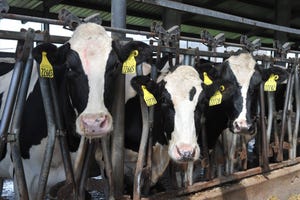GLOBAL HOT SPOTS: African countries make plans to fight army worm pest
China's new policy aims to increase soybean production; Japan to tap into emergency stockpiles of corn as inventories hit critically low levels.

Army worms are attacking crops in southern Africa, and 16 countries in that region agreed at a U.N. Food & Agriculture Organization (FAO) emergency meeting this month to develop plans to fight that pest as well as address other issues.
“Fall armyworm, which is mostly associated with the Americas, is a new threat in southern Africa, and we are very concerned with the emergence, intensity and spread of the pest,” said David Phiri, FAO coordinator for southern Africa.
Zambia reported that almost 222,300 acres of maize have been affected by the army worm, forcing farmers to replant their crops. In Malawi, some 42,000 acres have so far been affected, while in Namibia, approximately 123,500 hectares of maize and millet have been damaged.
The pests threaten the region’s food security at a time when it is recovering from drought.
Attache: China’s new policy aims to increase soybean production
In China’s new agricultural modernization guidelines, the government concedes that Chinese agriculture has struggled to become globally competitive due to limited arable land resources, outdated technology and rapidly rising production costs, according to the U.S. Department of Agriculture’s attache office.
“Under the new agricultural modernization plan for grain production, the government proposes a strategic production adjustment to reduce corn production and increase soybean production from 2016 to 2020,” the report said.
The targets include 550 million tons of grain production, with annual growth of 9%. For this major grain production adjustment, about 11.5 million acres of corn area, or 12.4%, will be used for other crops. Soybean area is expected to reach 23.2 million acres, a 44% increase.
Reuters: Japan corn stocks dwindle following shipping delays from U.S.
Japan's feed makers are expected to tap the country's emergency stockpiles of corn as inventories decline to critically low levels following a delay in shipments from the U.S., according to a Reuters report.
Japan's Ministry of Agriculture, Forestry & Fisheries plans to approve the measure after heavy storms off the U.S. West Coast caused lengthy delays in grain loadings. USDA projects Japan -- the world's top corn importer, whose main supplier is the U.S. -- to import 15 million metric tons in the 2016-17 crop year (September through August).
Japanese feed makers are required to hold emergency stocks of 850,000 mt of feed grains, mainly corn, which is equivalent to about one month's worth of local demand. The companies need to seek approval from the government to use the stocks in an emergency.
Also, at least one Japanese trade house said it is looking at other sources for corn, including China, Australia or Russia.
Blizzards, avalanches and heavy rains in recent weeks have hindered U.S. transport of corn, soy and wheat to ports, where they then head for the Asian market.
About the Author(s)
You May Also Like



